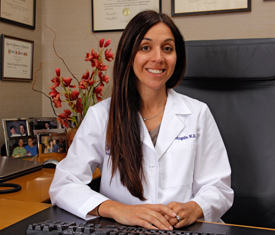Some 2.5 million people across the world have multiple sclerosis, but each one has different needs when it comes to treating the disease, said Dr. Tracy DeAngelis, an MS specialist at New Hyde Park-based Neurological Associates of Long Island.
“MS is as individual as your fingerprint, so each treatment plan, each choice of therapy, needs to be specifically selected for the type of MS and the severity, and most importantly patient concerns about safety and tolerability and lifestyle,” DeAngelis said.
Neurological Associates is one of several institutions participating in a worldwide clinical research study that could lead to big improvements in MS treatments, she said.
The PASSAGE Study is currently testing the long-term safety of several MS treatments in patients with “relapsing” forms of the disease, in which symptoms flare up during certain times and subside in others, who are starting new treatment regimens, DeAngelis said.
The study, started in 2011 and expected to run until 2022, is evaluating how often Fingolimod, a drug that treats MS flare-ups, and other clinical treatments have negative effects in patients, according to ClinicalTrials.gov, a database of clinical studies maintained by the National Institutes of Health and the National Library of Medicine.
Novartis, a drug company that manufactures and sells Fingolimod under the name Gilenya, is sponsoring the study. It is examining the “safety and tolerability” of 13 of the 15 MS treatments that the federal Food and Drug Administration has approved, DeAngelis said.
The study is observational, meaning it is less risky because no new drugs are being tested, she said. Neurological Associates has been participating for about a year and has about 20 patients enrolled, she said.
“They get to be watched more closely by their doctors and provide more detailed feedback on what their day-to-day struggles are with the disease and with their medications,” DeAngelis said.
Multiple sclerosis attacks nerve fibers in the brain and spinal cord, ultimately causing a communication breakdown when the brain tries to send signals to other parts of the body.
Between 300,000 and 400,000 people in the United States have the disease, though that estimate may be low because of changes in how the disease is diagnosed in reported, according to the Multiple Sclerosis Foundation.
It is more prevalent in women and is most often diagnosed in people in their 20s, 30s and 40s, though some doctors have been diagnosing more patients in their 60s and 70s in recent years, DeAngelis said.
She leads the MS treatment program at Neurological Associates with Dr. Richard H. Blanck. They aim to provide “state-of-the-art comprehensive treatment” while helping patients to choose their treatment options, DeAngelis said.
The PASSAGE Study could be instrumental to widening the field of options in the future, she said.
“In general, patient participation in clinical trials research has really been the cornerstone of advancing the field of MS treatment, certainly in the last two decades, and any strides we make in making better treatments rely on the courage of MS patients worldwide to help us learn more about how to fight this disease,” she said.
Anyone interested in participating in the PASSAGE study can visit passagestudy.com. Those interested in participating in clinical trials at Neurological Associates of Long Island can contact Stella Gurgova at 516-466-4700, ext. 140.



